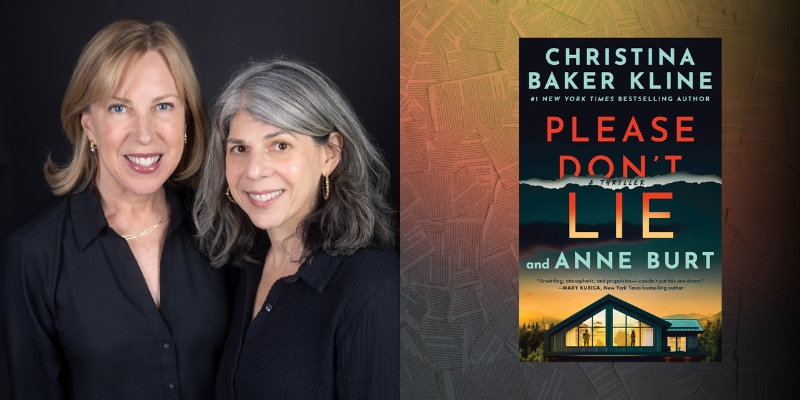We didn’t plan to write thrillers together. In fact, when we met twenty-five years ago at a bookstore in Montclair, New Jersey, our conversations veered more toward Tolstoy than true crime.
But over time—through the parallel tracks of parenting and a friendship rooted in reading and writing—we discovered something unexpected: a shared fascination with the darker corners of human nature. And eventually, we realized we wanted to write about it.
It started with a TV pilot. Christina was invited by a team of screenwriters with a production deal to develop a serialized crime drama. By that point, we’d been close friends for years—members of the same book club and writing group, co-editors of a collection of essays, and voracious consumers of novels, films and TV. It only made sense for Christina to loop Anne in.
Over the next few months, we immersed ourselves in the writers’ room model: hashing out characters and emotional arcs, shaping a show “bible,” learning how to build the bones of a series. We found the process exhilarating, equal parts problem-solving and invention, and quickly realized we thrived in that environment. If we’d been in our twenties, we joked, we might’ve packed up and headed to LA.
In the end, the executives wanted us to shift gears from a serial to a procedural. We played around with the idea but found ourselves less energized about a format where crimes resolve every hour-long episode. Our vision for the story was messier and murkier. We chose to bow out.
But something clicked during those long Zooms and text marathons. We’d developed a rhythm, a creative shorthand, and a mutual obsession with psychological suspense. We’d built a world together—and we wanted to keep going.
So when Christina was offered the chance to create a story outline for a scripted podcast, she reached out to Anne again. We quickly came up with an idea we both loved—dark, twisty, and emotionally charged. But when it came time to sign the contract, we paused. We didn’t want to hand it off. The idea was too good. We wanted to write it ourselves.
That outline became the basis for our novel Please Don’t Lie, the first in a series of thrillers set in the fictional Adirondack town of Crystal River, New York.
We were happy to find that we were well-matched as collaborators—something friendship doesn’t guarantee, no matter how much both parties want it to work. In hindsight, it makes sense.
We both grew up in academic households where ideas were debated around the dinner table. We’d spent years in writing groups, workshops, and book clubs. We already shared a deep bench of references—hundreds of novels discussed, dissected, and analyzed.
We also brought something less definable to our partnership: a “yes, and” sensibility. Borrowed from improv, that mindset has become our motto. You respond to an idea not with skepticism, but with momentum. You build. You stretch. You raise the stakes. It’s not just about agreeing; it’s about generating.
In practice, our collaboration looks like this: long walks in Central Park to brainstorm plot twists. A 24/7 text thread full of insomnia-fueled links to articles, quotes, and character ideas. Voice memos sent from the passenger seat of a moving car. Sessions at each other’s dining tables—our New York apartments are four blocks apart—with coffee, soup, and Google Docs open. And always, the question: What if…?
As we wrote and revised Please Don’t Lie together, we discovered a new voice, distinct from either of our solo styles. A voice that moves quickly, welcomes ambiguity, and isn’t afraid to explore the shadows.
It didn’t happen overnight. Along the way, we’ve written and abandoned outlines, reinvented story structures, pivoted formats, and repurposed false starts. But nothing was wasted. Every detour helped us refine our shared voice. Every misfire clarified the kind of story we wanted to tell.
For us, the key to successful co-writing has been a shared sensibility, even more than shared experience. Neither of us had written a thriller before Please Don’t Lie. But we were genre-curious. We both loved reading psychologically rich stories with high emotional stakes. Writing together gave us permission to take risks, to explore new territory free from the expectations of our previous work.
In a funny way, we were both beginners and veterans. We had decades of writing behind us, but we entered this project with fresh eyes. And we brought everything with us: our book group instincts, our love of pop culture (high and low), our feminist lens, our interest in how women navigate constraint and perception.
That shared cultural fluency gave us more than plot ideas—it gave us subtext. It gave us themes. It gave us a way to write about marriage, sisterhood, ambition, friendship, and identity through the heightened lens of suspense.
Our collaboration hasn’t replaced our solo work; we’re both writing novels on our own, too. But thriller writing is a different beast. It demands precision—where to place reveals, how to seed suspicion, how to pace the tension.
We’ve learned to outline rigorously (not our usual mode), to map character arcs alongside plot beats, to think in terms of reversals and red herrings. Interestingly, we’re finding that these tools are subtly reshaping our individual novels— tightening our pacing, sharpening our scenes, pushing us to think more deliberately about structure, stakes, and suspense.
Neither of us wants to let the other down, so we show up fully. We share the work equally. And at every stage, we’re trying to impress and entertain each other. That dynamic keeps us sharp, and it keeps us honest. (We’ve also learned how much fun it is to surprise each other!)
For those considering a creative partnership, here’s what we’ve learned:
- Start with trust and respect.The best collaborations are built on emotional safety. You have to be able to say the wild thing, the dumb thing, the unfinished thought—and know it won’t be judged.
- Shared taste matters more than shared background.You don’t have to write the same way. But you do need to want the same kind of outcome. You need a compatible sense of what’s “good.”
- Embrace the third voice.The book you write together shouldn’t sound like either of you—it should sound like both of you. Something new should emerge.
- Nothing is wasted.That TV pilot? That podcast pitch? The abandoned idea from five months ago? It’s all compost. Keep the scraps. They’ll nurture the soil for the next project.
- Stay curious and open. Collaboration isn’t compromise—it’s expansion. Let your partner take you somewhere you wouldn’t go alone.
We didn’t expect to become thriller writers. We didn’t expect to co-author a book. But here we are—two longtime friends who came together to create a writers’ room of two. Now we never want to leave.
***


















